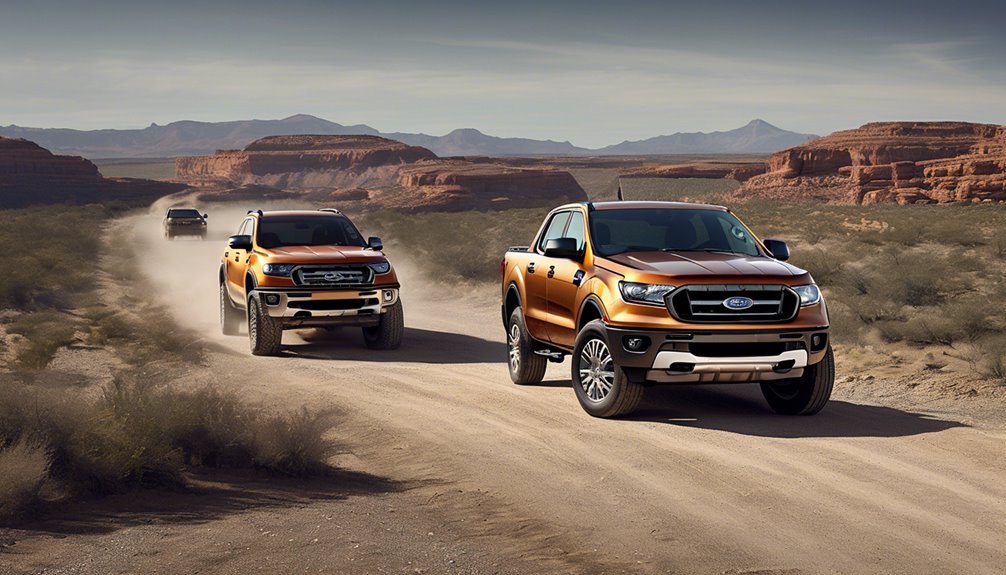
When you compare the 2019 Ford Ranger to the 2002 Explorer, the differences in performance are striking. The Ranger’s turbocharged engine delivers impressive power and torque, making it far more responsive on the road. Meanwhile, the Explorer’s older V6 engine falls short in agility and handling. As you explore the nuances of their powertrains and driving experiences, you’ll find compelling reasons to prefer one over the other.
Key Takeaways
- The 2019 Ford Ranger features a turbocharged engine that produces 270 horsepower, enhancing its responsiveness compared to the 2002 Explorer’s V6 with 210 horsepower.
- Ranger’s suspension tuning prioritizes handling precision, allowing for better maneuverability and responsiveness during sharp turns than the older Explorer.
- Modern engineering in the Ranger significantly improves acceleration and overall driving dynamics, contributing to a more agile driving experience.
- Advanced driver assistance technologies in the Ranger, like Lane-Keeping System and Adaptive Cruise Control, enhance responsiveness to changing driving conditions.
- The Ranger’s superior ride comfort and stability further improve overall driving responsiveness, making it a more enjoyable vehicle than the 2002 Explorer.
Powertrain and Engine Performance
When comparing the 2019 Ford Ranger and the 2002 Explorer, you’ll notice significant differences in powertrain and engine performance. The Ranger boasts a turbocharged 2.3-liter EcoBoost engine, delivering impressive power output and torque delivery that makes it feel more responsive on the road. You’ll find it generates around 270 horsepower and 310 lb-ft of torque, providing a thrilling driving experience. In contrast, the 2002 Explorer’s V6 engine produces only 210 horsepower and 254 lb-ft of torque, making it feel sluggish by today’s standards. As a result, the Ranger excels in acceleration and overall driving dynamics, ensuring you enjoy a more engaging ride. You’ll appreciate how modern engineering has transformed performance expectations in this comparison.
Handling and Suspension Dynamics
While both the 2019 Ford Ranger and the 2002 Explorer are designed to tackle various terrains, their handling and suspension dynamics reveal stark contrasts. The Ranger’s suspension tuning emphasizes handling precision, allowing you to navigate sharp turns with ease. In comparison, the Explorer’s older design leads to less responsive handling, especially on uneven surfaces.
| Feature | 2019 Ford Ranger |
|---|---|
| Suspension Tuning | Advanced Coil Spring |
| Handling Precision | High |
| Off-Road Capability | Excellent |
| Ride Comfort | Balanced |
| Stability | Superior |
Ultimately, if you value responsiveness and precision, the Ranger stands out, making it a better choice for spirited driving and off-road adventures.
Technology and Driver Assistance Features
As you explore the differences in handling and suspension, the technology and driver assistance features of the 2019 Ford Ranger and the 2002 Explorer further highlight the advancements in automotive design. The Ranger boasts impressive technology innovations that enhance your driving experience, making it a top choice for modern drivers. Here’s what stands out:
- Pre-Collision Assist: This driver assist feature helps you avoid potential accidents.
- Lane-Keeping System: It gently guides you back if you drift from your lane.
- Adaptive Cruise Control: Maintains your speed while adjusting to traffic conditions.
- Blind Spot Information System: Alerts you to vehicles in your blind spots.
These features in the Ranger demonstrate how far automotive technology has come since the 2002 Explorer, ensuring a safer, more enjoyable ride.
Fuel Efficiency and Environmental Impact
Considering the ever-growing importance of fuel efficiency and environmental impact, the 2019 Ford Ranger stands out as a more eco-friendly option compared to the 2002 Explorer. The Ranger’s advanced engineering helps it achieve impressive fuel economy figures, making it a better choice for those conscious of their carbon footprint. This model meets modern emissions standards, ensuring it produces fewer harmful pollutants than its predecessor. You’ll appreciate how the Ranger balances power and efficiency, allowing you to enjoy your drive without compromising the environment. By choosing the Ranger, you’re not only opting for a responsive vehicle but also making a responsible choice that aligns with today’s sustainability goals. It’s a win-win for both you and the planet.
Overall Driving Experience and Comfort
After discussing fuel efficiency, it’s important to explore how each vehicle feels on the road. The driving experience and comfort levels between the Ford Ranger and the 2002 Explorer can greatly impact your choice.
Here’s what you might notice:
- Interior Space: The Ranger offers a more modern layout, providing ample room for passengers and cargo.
- Seating Comfort: You’ll find the Ranger’s seats to be supportive and cozy, especially on long trips.
- Ride Quality: The Ranger handles bumps and rough terrain better, making for a smoother ride.
- Driving Dynamics: With its responsiveness, the Ranger enhances your overall driving experience, giving you more confidence behind the wheel.
Choosing between these two will ultimately depend on your priorities in comfort and performance.




